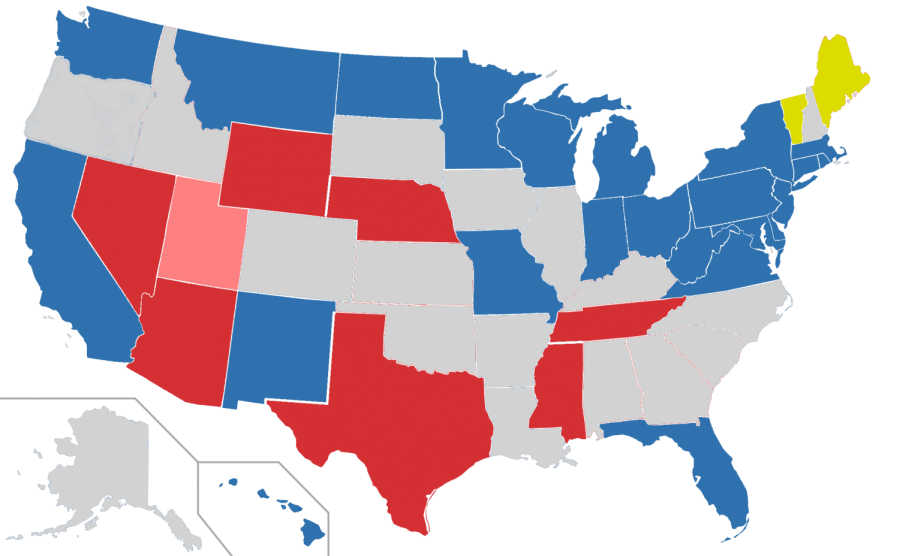Should Democrats up for re-election swing left or right? (politics chat)
October 19, 2018
 Colter Adams (Politics and Opinion Editor for the Lasso): Hi everybody, welcome to the first ever Lasso politics chat!
Colter Adams (Politics and Opinion Editor for the Lasso): Hi everybody, welcome to the first ever Lasso politics chat!

Sequoia Wyckoff (Politics Reporter for the Lasso): Hi!
 Elisabeth Snyder (Politics Reporter for the Lasso): Hey!
Elisabeth Snyder (Politics Reporter for the Lasso): Hey!
Colter Adams: So today we’re talking Midterm strategies for Democrats (and how they are being affected by Kavanaugh’s confirmation). To spice things up, each of us is going to play the role of a Democratic campaign strategist advising their candidate on which issues to campaign on.
But first some context: There are several indications that Democrats, particularly those in conservative states, are suffering politically for their fervent opposition to Kavanaugh’s confirmation. Heidi Heitkamp, who notably voted against Kavanaugh’s confirmation, is polling 12 points below her Republican challenger, despite being neck-and-neck throughout most of 2018. According to fivethirtyeight.com, Trump’s approval rating has been hovering around 42 percent, up from 39.9% on September 12, when reports about Kavanaugh’s assault first surfaced. And the generic ballot, according to fivethirtyeight.com, now favors Democrats by 8.6 points, down slightly since September. Overall, the political climate is not looking ideal for Democrats hoping to capitalize on the fallout from Kavanaugh’s confirmation.
I’ll be defending the most conventional position right now: Democrats in red states, and overall, should remain slightly to the right on polarizing issues if they expect to win their elections. “Polarizing issues,” being any issue that is clearly divided down partisan lines (examples: Kavanaugh confirmation, immigration, and #metoo).
Sequoia Wyckoff: And I’ll be arguing that Dems in swing states should be staying left on divisive issues. As Colter mentioned, a clear example of such an issue is Kavanaugh’s confirmation.
Elisabeth Snyder: I’m going to be taking a completely different position, and one that hasn’t been getting as much news coverage: that Democratic candidates should avoid taking a stance on heavily partisan issues altogether, until the election, in order to appeal to centrist voters and hopefully pull out a midterm victory.
Colter: I think the best case study in support of my argument is the success of Joe Manchin’s campaign. Manchin bet against the national progressive momentum carrying over into deep-red West Virginia, voting to confirm Kavanaugh (the only Democrat to do so), taking a staunchly pro-coal stance, and even considering endorsing Trump in 2020. This seems to have paid off. He is now polling 9.4 points above his opponent, WV Attorney General Patrick Morrissey, and RealClear Politics recently changed his Senate seat’s rating from “toss-up” to “leans blue.” Meanwhile, other incumbent Democrats in red states who received significant media coverage for taking a stand against Kavanaugh, such as Heidi Heitkamp, or limited media coverage, such as Joe Donnelly, and Claire McCaskill, are running neck-and-neck in the polls, or in Heidi’s case, lagging behind.
If Democrats are going to win in pro-Trump states like Indiana, North Dakota, and Missouri, they are going to have to combat the perception that the midterms are a referendum on Donald Trump- in other words- a vote for a Democrat is a vote against the President. This means they need to publically distance themselves from generally progressive causes like #metoo, democratic socialism, and the campaigns to impeach Trump and repeal ICE.
Elisabeth: As helpful as it may seem to lean to the right in an effort to gain support from more conservative voters, we haven’t see how Joe Manchin’s campaign will pan out. His run to the right may have cost him the support of more progressive Democrats who would bolster the grassroots movement and fund his campaign. By moving to the right, he is alienating his base and may still fail to capture the conservative vote. Now he’s a candidate whose decisions are hard to square up to the beliefs of either party, which could cause him to lose the election in November.
Sequoia: I would buy the argument that in general, swing state Dems moving towards the middle and disassociate themselves from progressive standpoints would be the right move. But the issues defining these midterms, like #metoo and abolishing ICE, are so divisive and emotional for voters that there isn’t usually a moderate stance. So there are two options – swing left, securing the support of the left and losing the (already limited) support of the right, or swing right, jeopardizing the support of the left and gaining the (again, limited!) support of the right.
Joe Manchin took the latter option when it came to Kavanaugh’s confirmation. He’s known for crossing party lines; this is not something new. But the confirmation vote was particularly emotionally charged. And most voters, when seeing the ballot, won’t be thinking strategically about which candidate is most likely in the long run to best represent their views – they’ll see Manchin’s name and think oh, that’s the one Democrat that voted for Kavanaugh. Sure, that will score him some points for some, but it’s also completely disqualifying for a lot of voters that, before the vote, were supporting him.
Colter, you also mentioned Heidi Heitkamp – when she voted against Kavanaugh, it’s true that she probably lost the vote of some of her conservative supporters (but tbh she doesn’t really have any conservative supporters to lose). If Heitkamp hadn’t done “the right thing” in the minds of her liberal constituency and voted against Kavanaugh, she would have appeared as willing to compromise her core values. Already falling behind, Heitkamp couldn’t afford to lose that trust.
Colter: What trust does she have to lose in a state that went for Trump by 36 points? Also re: Elisabeth, Joe Manchin was primaried by a progressive Democrat, and won by a massive margin.
Sequoia: She risks losing the trust of the 37% that didn’t vote for Trump (and the 44% that disapprove of Trump right now)
Elisabeth: Colter, regardless of whether a base agrees more with a progressive candidate, they’ll be more likely to vote for the incumbent. This is something that we’re seeing right now in Falls Church. State Senator Dick Saslaw is facing Yasmine Taeb, a progressive primary challenger, but many progressives continue to support Saslaw because of his position in the VA Senate.
Also, that primary happened before Manchin voted for Kavanaugh, so the primary results didn’t reflect the effects of his vote.
Colter: Right, but if most of the Democratic base of WV was willing to compromise their ideals for a famously conservative Democrat during the primary (incumbency advantage or not), doesn’t that indicate W.V. Dems are pragmatic enough to tolerate Joe Manchin’s right-leaning campaign, if it means there is a greater chance of Dems taking back the Senate in Nov?
Elisabeth: I think they could tolerate it, but they wouldn’t be the excited and riled-up base that Democratic candidates need in order to convince others to vote in the election. The most important thing is winning the House (and hopefully the Senate), and the best way to achieve that goal is by neither alienating the far left or the far right and playing to the center.
Sequoia: I would argue that, as you started to mention @Elisabeth, a Democrat swinging right leaves very few voters particularly enthusiastic – and swing state Dems need excited voters to campaign for them. I.e. the candidate in Tennessee, Bredesen, reportedly lost volunteers after coming out in support of Kavanaugh.
Colter: But do you think those lost volunteers really translate into a net loss of votes for Bredesen? I think that with Democratic priorities centered on national politics (taking back the Senate and House), Democratic voters in states with candidates running to the right will be willing be relatively willing to buy the “lesser of two evils” argument, while Independents and Republicans-much bigger blocks of voters in these states- will consider the conservative stances of Democrats running in their states as a sign of independence in spite of pressure from the national party and progressive organizers out-of-state. Considering Heitkamp, Donnelly, Manchin, and other conservative Dems have approval ratings that dwarf the number of registered Democrats in their respective states, their campaigns will, and should, remain focused on bridging the gap between reliable supporters and the threshold for victory.
Elisabeth: I think what you’re missing, Colter, is that the support of these progressive and more left-leaning Democrats doesn’t just translate into votes. It translates to campaign donations and volunteers, which will benefit the campaigns overall. As Sequoia said, Bredesen lost volunteers after supporting Kavanaugh–and I expect that will translate to fewer votes in November’s election.
In 9/10 elections in 2012, the candidate who fundraised the most won. That speaks to the power of money in politics, and the power of a base that believes in their candidate enough to donate.
Sequoia: “As Sequoia said” -we girls love supporting girls
Colter: Ummm…. there isn’t necessarily a direct link between fundraising and electoral success tho (in 80% of cases, fundraising not a great predictor of success)
Elisabeth: Are you going to defy the Washington Post? I understand what you’re saying about the absence of a direct link, but I think that, regardless of whether what you’re saying is true, our claims aren’t mutually exclusive and there is a correlation between success and fundraising.
Colter: Vox>>>
Elisabeth: vox isn’t as credible
Colter: Lol ok
Sequoia: Okay, hope you had fun arguing literally the easiest side, Colter!
Elisabeth: rt
Colter: Yup- when ur an editor, you can do pretty much whatever you want (Right Mr. Laub?)
Anyway, I think that’s it for our first politics chat. Let us know what you think in the comments- or don’t. Also, make sure to vote in our poll!
Thanks, Sequoia and Elisabeth for tolerating my long-windedness.
Sequoia: Np, pretty sure Elisabeth and I won though
Colter: *Even though you were technically arguing against each other*
Elisabeth: yay for Democrats who don’t ditch the Democrats! (throwing shade at you, Joe Manchin!)

















Izzy • Oct 25, 2018 at 3:57 PM
I believe the question at hand is not if Democrats should swing left or right, but would they actually stay left or right sided? A Democrats by nature would be more left sided. Therefor A Democrat would have to change their views to become right sided. Its very likely that a demarcate will always swing left. Which makes it very hard for a Democrat to see the views of the right side.
Facts • Oct 25, 2018 at 3:52 PM
I feel that if they use a right leaning tactic to win, they wouldn’t stick with it. All politicians, especially on the left, are slimy and dont follow through. I feel that it would be smarter to elect a Rebublican due to the fact that they actually try to follow through on the things they say. So I feel that leaning far left on any topic is bad because of all the bad things the left has supported and done.